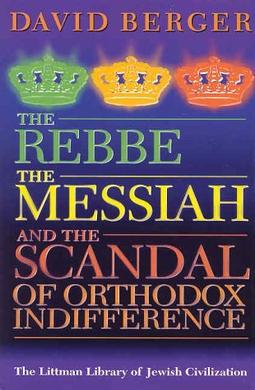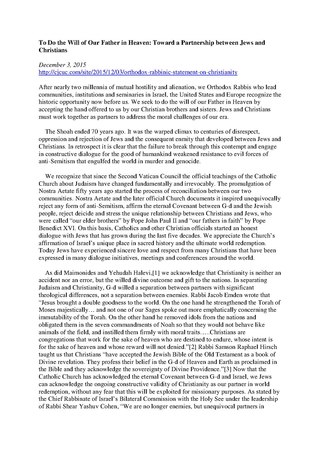Christianity began as a movement within Second Temple Judaism, but the two religions gradually diverged over the first few centuries of the Christian era. Today, differences of opinion vary between denominations in both religions, but the most important distinction is Christian acceptance and Jewish non-acceptance of Jesus as the Messiah prophesied in the Hebrew Bible and Jewish tradition. Early Christianity distinguished itself by determining that observance of halakha was not necessary for non-Jewish converts to Christianity. Another major difference is the two religions' conceptions of God. Depending on the denomination followed, the Christian God is either believed to consist of three persons of one essence, with the doctrine of the incarnation of the Son in Jesus being of special importance, or like Judaism, believes in and emphasizes the Oneness of God. Judaism, however, rejects the Christian concept of God in human form. Christianity recognizes the Hebrew Bible as part of its scriptural canon, Judaism does not recognize the Christian New Testament.

Judaism is an Abrahamic monotheistic ethnic religion that comprises the collective spiritual, cultural, and legal traditions of the Jewish people. Religious Jews regard Judaism as their means of observing the Mosaic covenant, which was established between God and the Israelites, their ancestors. The religion is considered one of the earliest monotheistic religions in the world.
The subject of homosexuality and Judaism dates back to the Torah. The book of Vayikra (Leviticus) is traditionally regarded as classifying sexual intercourse between males as a to'eivah that can be subject to capital punishment by the current Sanhedrin under halakha.

A rabbi is a spiritual leader or religious teacher in Judaism. One becomes a rabbi by being ordained by another rabbi—known as semikha—following a course of study of Jewish history and texts such as the Talmud. The basic form of the rabbi developed in the Pharisaic and Talmudic eras, when learned teachers assembled to codify Judaism's written and oral laws. The title "rabbi" was first used in the first century CE. In more recent centuries, the duties of a rabbi became increasingly influenced by the duties of the Protestant Christian minister, hence the title "pulpit rabbis", and in 19th-century Germany and the United States, rabbinic activities such as sermons, pastoral counseling, and representing the community to the outside all increased in importance.
The Pharisees were a Jewish social movement and school of thought in the Levant during the time of Second Temple Judaism. Following the destruction of the Second Temple in 70 AD, Pharisaic beliefs became the foundational, liturgical, and ritualistic basis for Rabbinic Judaism. Although the group no longer exists, their traditions are of great importance for the manifold Jewish religious movements.
Messianic Judaism is a syncretic Abrahamic new religious movement that combines various Jewish traditions and elements of Jewish prayer with Evangelical Protestant theology. It considers itself to be a form of Judaism but is generally considered to be a form of Christianity, including by all major groups within mainstream Judaism, since Jews consider belief in Jesus as the Messiah and divine in the form of God the Son to be among the most defining distinctions between Judaism and Christianity. It is also generally considered a Christian sect by scholars and other Christian groups.

The Messiah in Judaism is a savior and liberator figure in Jewish eschatology who is believed to be the future redeemer of the Jews. The concept of messianism originated in Judaism, and in the Hebrew Bible a messiah is a king or High Priest of Israel traditionally anointed with holy anointing oil.
Adherents of Judaism do not believe that Jesus of Nazareth was the Messiah or Prophet nor do they believe he was the Son of God. In the Jewish perspective, it is believed that the way Christians see Jesus goes against monotheism, a belief in the absolute unity and singularity of God, which is central to Judaism; Judaism sees the worship of a person as a form of idolatry, which is forbidden. Therefore, considering Jesus divine, as “God the Son”, is forbidden.

Rabbinic Judaism, also called Rabbinism, Rabbinicism, or Rabbanite Judaism, has been an orthodox form of Judaism since the 6th century CE, after the codification of the Babylonian Talmud. Rabbinic Judaism has its roots in the Pharisaic school of Second Temple Judaism and is based on the belief that Moses at Mount Sinai received both the Written Torah and the Oral Torah from God. The Oral Torah, transmitted orally, explains the Written Torah. At first, it was forbidden to write down the Oral Torah, but after the destruction of the Second Temple, it was decided to write it down in the form of the Talmud and other rabbinic texts for the sake of preservation.
Hyam Maccoby was a Jewish-British scholar and dramatist specialising in the study of the Jewish and Christian religious traditions. He was known for his theories of the historical Jesus and the origins of Christianity.
Schisms among the Jews are cultural as well as religious. They have happened as a product of historical accident, geography, and theology.

Jacob Shmuel Boteach, known as Shmuley Boteach, is an American rabbi, author, and media host.
David Berger is an American academic, dean of Yeshiva University's Bernard Revel Graduate School of Jewish Studies, as well as chair of Yeshiva College's Jewish Studies department. He is the author of various books and essays on medieval Jewish apologetics and polemics, as well as having edited the modern critical edition of the medieval polemic text Nizzahon Vetus. Outside academic circles he is best known for The Rebbe, the Messiah, and the Scandal of Orthodox Indifference, a criticism of Chabad messianism.
Early criticism of Judaism and its texts, laws, and practices originated in inter-faith polemics between Christianity and Judaism. Important disputations in the Middle Ages gave rise to widely publicized criticisms. Modern criticisms also reflect the inter-branch Jewish schisms between Orthodox Judaism, Conservative Judaism, and Reform Judaism.

The Rebbe the Messiah, and the Scandal of Orthodox Indifference is a book by Rabbi Dr. David Berger on the topic of Chabad messianism and the mainstream orthodox Jewish reaction to that trend. Rabbi Berger addresses the Chabad-Messianic question, regarding a dead Messiah, from a halachic perspective. The book is written as a historical narrative of Berger's encounter with Chabad messianism from the time of the death of the Lubavitcher Rebbe, Rabbi Menachem Mendel Schneerson in 1994 through the book's publication in 2001. The narrative is interlaced with Dr. Berger's published articles, written correspondences, and transcribed public lectures, in which he passionately appeals to both the leadership of the Orthodox and Chabad communities for an appropriate response to Chabad-Lubavitch messianism.
Heresy inJudaism refers to those beliefs which contradict the traditional doctrines of Rabbinic Judaism, including theological beliefs and opinions about the practice of halakha. Jewish tradition contains a range of statements about heretics, including laws for how to deal with them in a communal context, and statements about the divine punishment they are expected to receive.

Jacob Immanuel Schochet was a Swiss-born Canadian rabbi who wrote on Hasidic Judaism. He was a member of the Chabad movement.
Moshe D. Gutnick is an Australian Orthodox rabbi, and a member of the ultra Orthodox Chabad Hasidic movement. Rabbi Gutnick is a senior member of the Beth Din in Sydney, Australia. Gutnick is currently President of the Rabbinical Council of Australia and New Zealand. Gutnick is the head of the NSW Kashrut Authority. He formerly served as the rabbi of the Bondi Mizrachi Synagogue in Sydney.
Judaeo-Christian ethics is a supposed value system common to Jews and Christians. It was first described in print in 1941 by English writer George Orwell. The idea that Judaeo-Christian ethics underpin American politics, law and morals has been part of the "American civil religion" since the 1940s. In recent years, the phrase has been associated with American conservatism, but the concept—though not always the exact phrase—has frequently featured in the rhetoric of leaders across the political spectrum, including that of Franklin D. Roosevelt and Lyndon B. Johnson.

To Do the Will of Our Father in Heaven: Toward a Partnership between Jews and Christians is the Orthodox Rabbinic Statement on Christianity published by the Center for Jewish–Christian Understanding and Cooperation (CJCUC) in 2015. It was initially signed by over 25 prominent Orthodox rabbis in Israel, United States, and Europe, and now has over 60 signatories.









